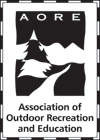Abstract
This case study applied a modified Experiential Learning Theory (ELT) model in an undergraduate outdoor recreation management course. The Kolb (1984) ELT model was modified to accommodate the higher education learning processes suggested by L. B. Sharp (1943), Sugarman (1985) and Greenaway (1995). Results indicate evidence of increased student learning. Quantitative results from a retrospective pre/posttest evaluation of change score means in learning outcomes supported the study hypotheses that 1) the application of a modified ELT model affects the outcomes of planning, knowledge/skills, and potential for transfer of learning and 2) previous trip experience affects these outcomes. A secondary analysis of qualitative data supports the notion that the experiential learning process inherently increased student personal development. Implications for instructors and research are discussed.
Recommended Citation
Roark, M. F.,
& Norling, J.
(2010).
An Application of a Modified Experiential Learning Model for a Higher Education Course: Evidence of Increased Outcomes.
Journal of Outdoor Recreation, Education, and Leadership, 2(1).
https://doi.org/10.7768/1948-5123.1028


